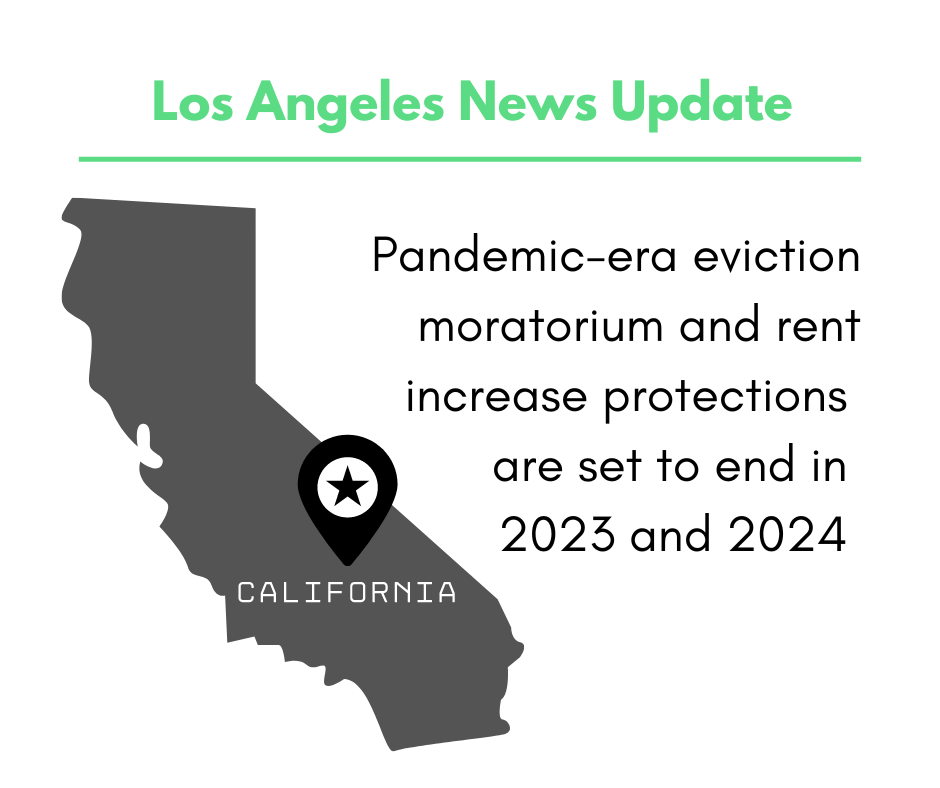
The Covid-19 Emergency Rental Assistance Program has been in place since the beginning of the pandemic, and it’s put a freeze on evictions and rent hikes for people in rent-controlled housing. Now that things are (kind of) back to normal, LA City Council has been trying to figure out when to lift some or all of these protections. Last week on September 28th, the LAHD Adhoc committee made recommendations to the Council, that they hoped would be a compromise between the landlords who wanted protections lifted and tenants who wanted them to remain in place.
On October 4th, the City Council considered the committee's suggestions and made their final decisions on when and how to roll back the Emergency Rental Assistance Program. On October 13th, Mayor Garcetti signed off on their plan. Read on to find out more.
Back-Rent Evictions
In a unanimous vote, the Council has agreed that evictions can resume on February 1st, 2023.
However, tenants with unpaid rent from December 1st, 2022 to January 31st, 2023 will have continued eviction protections if they were financially impacted by Covid-19 and supplied notice to their landlord within 7 days after the rent was due. That is, unless, there were extenuating circumstances that prevented the tenant from issuing notice within those 7 days, for example, if the tenant fell ill or if they were providing care to an ill loved one. While it is encouraged that the tenant provided that notice in writing, it isn't mandatory.
Rental debt from March 1st, 2020 to September 30th, 2021 must be paid by August 1st, 2023. Debt from October 1st, 2021 to January 31st, 2023 must be paid by February 1st, 2024.
No-Fault Evictions
No-fault eviction protection will be lifted January 31, 2023. As the name suggests, these evictions happen despite a tenant not violating their rental agreement. One example of a no-fault eviction is if the property owner decides to sell or demolish the property, (under the Ellis Act). These evictions can resume after the moratorium expires on January 31st, 2023, but require an additional 60 days' notice plus monetary relocation assistance. The council said they're currently exploring how they can expand these no-fault eviction protections to non-rent controlled properties as well.
During the Covid protection period, additional unapproved roommates were permitted to stay in a unit, so they would fall under no-fault evictions. These additional roommates have until 60 days after February 1st, 2024 to move out or else face eviction. If an unauthorized roommate moved in after January 31st, 2023, tenants would be violating their rental agreement, which would be an at-fault eviction, and thus could be evicted anytime after February 1st, 2024.
Unauthorized pets were also permitted to stay during the protection period. Like the unauthorized tenants, if an unauthorized pet moved in after January 31st, 2023, that would be considered a violation of the rental agreement, and would not be protected.
Additionally, no-fault or at-fault evictions that come from a government order can resume immediately.
Rent Increases
Since March 2020, there has also been a halt on rent increases for rent-controlled properties in city of Los Angeles. Starting February 1st, 2024, landlords may implement increases again. The increase range at the moment is between 3-8%, and cannot be increased more than once per year. That means that landlords can not make up for the yearly increases they missed out on over the (by that time) four years that protections have been in place. They must also continue to provide 30 days' notice before the increase goes into effect.
Are you a tenant or a landlord, and think you might be affected by these rental protections being lifted? If you have any questions about what this means for you or your property, don't hesitate to email us or give us a call at (323) 412-9060.
Posted by Ben Nicolas on
Leave A Comment